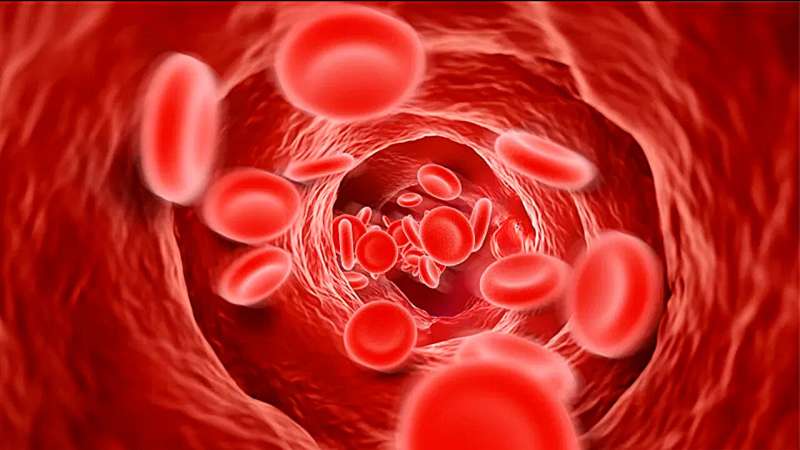
NIH-led study finds genetic markers that explain up to 12% of the differences between two people’s blood pressure. Credit: Darryl Leja, National Human Genome Research Institute
National Institutes of Health researchers and collaborators have discovered over 100 new regions of the human genome, also known as genomic loci, that appear to influence a person’s blood pressure. Results of the study also point to several specific genomic loci that may be relevant to iron metabolism and a type of cellular receptor known as adrenergic receptors.
The study, published in Nature Genetics, is one of the largest such genomic studies of blood pressure to date, including data from over 1 million participants and laying the groundwork for researchers to better understand how blood pressure is regulated. Such insights could point to potential new drug targets.
“Our study helps explain a much larger proportion of the differences between two people’s blood pressure than was previously known,” said Jacob Keaton, Ph.D., staff scientist in the Precision Health Informatics Section within the National Human Genome Research Institute’s (NHGRI) Intramural Research Program and first author of the study. “Our study found additional genomic locations that together explain a much larger part of the genetic differences in people’s blood pressure. Knowing a person’s risk for developing hypertension could lead to tailored treatments, which are more likely to be effective.”
To understand the genetics of blood pressure, the researchers combined four large datasets from genome-wide association studies of blood pressure and hypertension. After analyzing the data, they found over 2,000 genomic loci linked to blood pressure, including 113 new regions. Among the newly discovered genomic loci, several reside in genes that play a role in iron metabolism, confirming previous reports that high levels of accumulated iron can contribute to cardiovascular disease.
The researchers also confirmed the association between variants in the ADRA1A gene and blood pressure. ADRA1A encodes a type of cell receptor, called an adrenergic receptor, that is currently a target for blood pressure medication, suggesting that other genomic variants discovered in the study may also have the potential to be drug targets to alter blood pressure.
“This study shows that these big genome-wide association studies have clinical relevance for finding new drug targets and are needed to discover more drug targets as we go forward,” said Dr. Keaton.
From these analyses, the researchers were able to calculate a polygenic risk score, which combines the effects of all genomic variants together to predict blood pressure and risk for hypertension. These risk scores consider which genomic variants confer risk for hypertension and reveal clinically meaningful differences between people’s blood pressure.
Polygenic risk scores have potential to serve as a useful tool in precision medicine, but more diverse genomic data is needed for them to be applicable broadly in routine health care. While the collected data was mostly from people of European ancestry (due to limited availability of diverse datasets when the study was started), the researchers found that the polygenic risk scores were also applicable to people of African ancestry, which was confirmed through analyzing data from NIH’s All of Us Research Program, a nationwide effort to build one of the largest biomedical data resources and accelerate research to improve human health.
Nearly half of adults in the United States have high blood pressure, known as hypertension. High blood pressure often runs in families, meaning that there is a genetic component to developing the condition in addition to environmental contributions such as a high-salt diet, lack of exercise, smoking and stress. When blood pressure is consistently too high, it can damage the heart and blood vessels throughout the body, increasing a person’s risk for heart disease, kidney disease, stroke and other conditions.
The project was led by researchers at NHGRI in collaboration with Queen Mary University of London, Vanderbilt University Medical Center, Nashville, Tennessee, the University of Groningen in the Netherlands and other institutions, as part of the International Consortium of Blood Pressure. Over 140 investigators from more than 100 universities, institutes and government agencies contributed to this international study.
More information:
Genome-wide analysis in over 1 million individuals of European ancestry yields improved polygenic risk scores for blood pressure traits, Nature Genetics (2024). On Research Square: DOI: 10.21203/rs.3.rs-1409164/v1
Citation:
New study finds genetic markers that explain up to 12% of the differences between two people’s blood pressure (2024, April 30)
retrieved 30 April 2024
from https://medicalxpress.com/news/2024-04-genetic-markers-differences-people-blood.html
This document is subject to copyright. Apart from any fair dealing for the purpose of private study or research, no
part may be reproduced without the written permission. The content is provided for information purposes only.
>>> Read full article>>>
Copyright for syndicated content belongs to the linked Source : Medical Xpress – https://medicalxpress.com/news/2024-04-genetic-markers-differences-people-blood.html
